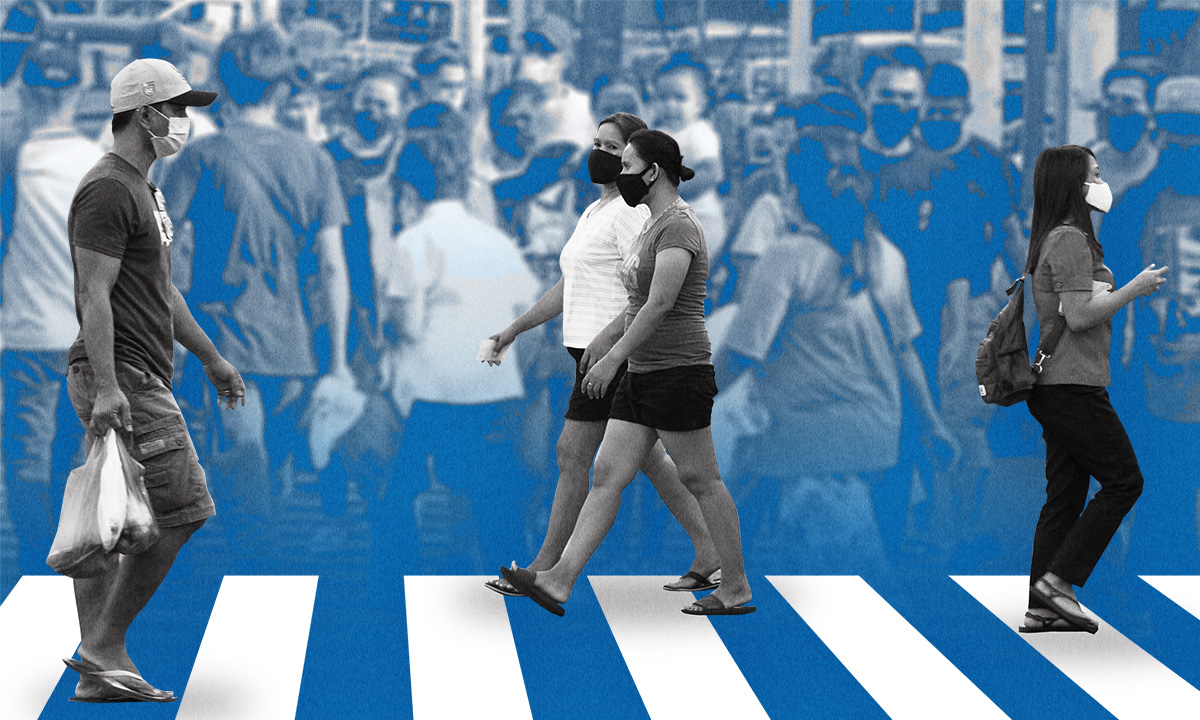MANILA, Philippines—Higher penalties are likely to be ineffective against jaywalking, or when a person crosses a street outside pedestrian lanes or overpass bridges.
This was stressed by Robert Siy, co-convener of Move As One Coalition, in response to the government’s proposal to impose tougher penalties for jaywalking.
Last week, the Metropolitan Manila Development Authority (MMDA) said it is considering a P1,000 fine, which is higher than the P500 currently being charged to violators.
READ: MMDA eyeing to double fine for jaywalking on Edsa, C5 road
The statement of MMDA chairman Romando Artes came a few weeks after Interior Secretary Benhur Abalos Jr. suggested it. “Go all the way, maximize it,” Abalos said.
READ: Abalos wants higher fines for jaywalking on Edsa, C-5
But Siy pointed out that “higher fines are unlikely to be an effective deterrent.”
“People who cross C5 and Edsa are already risking their lives, [which is] of much greater value than the amount of the fine,” he said.
RELATED STORY: Scare tactics for jaywalkers
The government, he said, should work on making roads capable of serving millions of diverse road users instead of mainly four-wheeled motor vehicles.
Back in 2018, 51,470 individuals were apprehended for jaywalking, prompting the MMDA to propose the inclusion of the violation on the records of the National Bureau of Investigation.
READ: MMDA eyes charges vs stubborn jaywalkers
‘Serve pedestrians’
The coalition said based on a 2015 study conducted by the Japan International Cooperation Agency (JICA), 79.5 percent of residents in Metro Manila travel by walking or public transportation.
Almost 50 percent of onsite workers said they walk to work. It was the most common response, the Social Weather Stations said in 2020.
The Move As One Coalition pointed out: “People who walk — not those inside cars — are more vulnerable to harm, even death, whenever there is a road crash.”
It said “it is not fair to deny pedestrians safety on streets to make the travel of 6 percent of Filipinos who have cars more convenient.”
Siy stressed that “people who cross C5 or EDSA on foot are likely doing so because they are left with no choice.”
“It could be because they are physically unable to use a footbridge or because the next pedestrian crossing is very far away,” he said.
Barrier
The Department of Health had said most victims—57,000—in road crashes are hit by vehicles from 2005 to 2015.
As explained by Siy, “a big part of the reason for jaywalking is that the road infrastructure has become itself a significant barrier for pedestrians.”
This forces people to find some way to overcome the barrier, he said.
Siy said: “Higher fines for jaywalking also push the narrative that Edsa should be a ‘highway for cars’ rather than a people-oriented corridor.”
“Instead, we should recognize Edsa as an urban boulevard that goes through many districts of high population density and high economic activity,” he pointed out.
The solution, he said, “is to revise our road infrastructure to make it pedestrian-friendly and PWD (persons with disability)-friendly.”
“This is the response we need to see from MMDA—instead of blaming pedestrians, it should look for how roads can be re-designed to enable pedestrians to cross conveniently and safely,” he said.
Victim-blaming
Siy stressed that “proposing higher fines is a form of ‘victim blaming’ and promotes the narrative that many Filipinos are ‘pasaway’ and require stricter controls.”
RELATED STORY: MMDA halts operations of own anti-jaywalking unit for ‘duping’ violators
“It conceals the reality that our roads are basically hostile for pedestrians and PWDs and are making us less mobile and more car-dependent,” he said.
The coalition reminded the government of what it stated in its Philippine Development Plan 2023-2028 — that pedestrians and cyclists will be given the highest place in the hierarchy of road users.
“Pedestrians should be protected and rewarded, not penalized, for choosing a non-polluting mode of transport,” it stressed.
This, it said, will encourage more people to walk, too. “With this, traffic will no longer be congested, air will be cleaner, and people will be healthier.”
So the government, Move As One coalition pointed out, should work on making roads safer, especially for pedestrians. It proposed these:
- Implement the 30 kilometer/hour “speed limit,” which, the World Health Organization said, is the “safest” in areas where there are pedestrians and vehicles
- Provide better walkways and ramps, especially for PWDs
- Plant trees so that pedestrians can have a cover from heat
- Make certain that no car is blocking walkways
- Do away with “footbridges” or “elevated walkways” that only burden the elderly, PWDs, and those that carry small children and heavy things
- Create “at grade crossings” that are at the same level with roads, and place “countdown stop lights” that will give pedestrians enough time to cross
